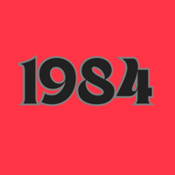
Overview
Synopsis
BIG BROTHER IS ALWAYS WATCHING YOU. This warning rules the frightening, dystopian future of George Orwell’s classic novel, 1984, adapted for the stage by Robert Icke and Duncan Macmillan. The totalitarian Party outlaws individualism, independence, and free thought, warping the past to their will and controlling its citizens with fear and violence. In the heart of this bleak world, Winston Smith dares to dream of a world free of Big Brother. Through small acts of defiance — starting a diary, falling in love — one lone man manages to take a stand for truth, freedom, and hope for the generations to come.
Show Information
Context
Playwrights Robert Icke and Duncan Macmillan adapted 1984 from George Orwell’s dystopian classic. The novel, published in 1949, follows everyman Winston Smith as he dreams of escaping the totalitarian state of Big Brother. The book has enjoyed immense critical success and cultural impact, and is frequently cited as one of the best novels of the 20th century.
In writing the play, Icke and Macmillan sought to not only adapt the novel, but
to read the context for 1984 and to unlock other amazing theatre resources!Plot
Editor’s notes: 1984 has a disjointed narrative structure. At times, Winston’s attention is pulled from the main story, by flashes of his torture and interrogation, or a sudden awareness of the events being discussed by the Host, Man, Father, Mother, and Martin.
All alone and hopefully unwatched, Winston dares to do the most dangerous act in society: start a diary. He knows that this will likely end in his death; there is always a chance that the Thought Police are watching, and
to read the plot for 1984 and to unlock other amazing theatre resources!Characters
| Name | Part Size | Gender | Vocal Part |
|---|---|---|---|
|
Lead |
Male |
Spoken |
|
|
Supporting |
Female |
Spoken |
|
|
Supporting |
Male |
Spoken |
|
|
Supporting |
Male |
Spoken |
|
|
Supporting |
Male |
Spoken |
|
|
Supporting |
Male |
Spoken |
|
|
Supporting |
Male |
Spoken |
|
|
Supporting |
Female |
Non-singer, Soprano, Mezzo-Soprano, Alto |
|
|
Supporting |
Female |
Spoken |
Songs
A song with an asterisk (*) before the title indicates a dance number; a character listed in a song with an asterisk (*) by the character's name indicates that the character exclusively serves as a dancer in this song, which is sung by other characters.
Monologues
Scenes
Key Terms
An adaptation is a reworking of a story from one medium or cultural context into another, such as turning a novel into a play or updating a classic play’s setting. Adaptations often reinterpret themes, characters, and style for new audiences. They can range from faithful recreations to bold reimaginings.
A dramatic setting depicting a repressive future society, used to explore political and philosophical themes.
An early 20th-century movement embracing speed, technology, and modernity, influencing avant-garde theatrical forms.
Videos
Quizzes
Themes, Symbols & Motifs
Sorry! We do not currently have learning modules for this guide.
Quote Analysis
Sorry! We do not currently have learning modules for this guide.
